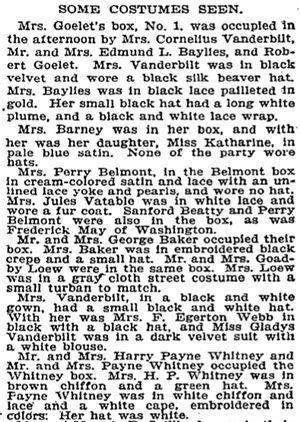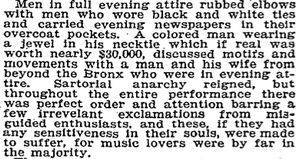Alex Ross's Blog, page 202
February 21, 2012
Ashbery on music
The beginning of "More Reluctant," a John Ashbery poem in this week's New Yorker:
It's time for a little chamber music
of Arensky or Borodin, something minor
and enduring, as we imagine ourselves
to be, let that be a wake-up call,
as the man said . . . .
I've had the good fortune to meet Ashbery on a few occasions, and am always eager to hear of his musical discoveries. While his knowledge of the repertory is fairly comprehensive, he has a particular love for lesser-known composers of the late nineteenth and early twentieth centuries. On one occasion he mentioned to me that he was very absorbed in the music of Tristan Klingsor, and another time he extolled the piano pieces of Georgy Catoire. He writes about Ernest Chausson's Le Roi Arthus in the liner notes to Leon Botstein's recording of that work; Botstein has said that Ashbery got him interested in the opera. Earlier this month, Ashbery received a National Humanities Medal from President Obama.
February 20, 2012
Björk, MTT
In this week's issue of The New Yorker, I have two shorter pieces: a Talk of the Town item about Björk's Biophilia education project — "I want the kids to feel like they're superheroes of sound," she told me — and a Critic's Notebook about the San Francisco Symphony's American Mavericks project. Both pieces are available only to subscribers. (I talked to this information, and it does not want to be free.) Above, a photo of the fabulous Queens middle-schoolers with the singing Tesla coil; below, a picture of the kids with their science/music teachers and the excellent musician-artist Curver, who runs the program. Curver plays with Einar Örn in the band Ghostigital.
February 18, 2012
Clipping
"America is a pathetic place where something stupefying must always happen for fear we wake up."
— William Carlos Williams, "The Venus"
Chávez and El Sistema
Here is video of Gustavo Dudamel conducting "Mambo" from West Side Story at a rally celebrating the bicentennial of Venezuela last summer. When it's over, at 3:20, you see an image of Hugo Chávez accompanied by the slogan "¡Pa'lante Comandante!" — "Forward, Commander!" Dan Wakin examines the controversy over Chávez's relationship with El Sistema and Dudamel in the New York Times.
In other music-and-politics news, Anna Netrebko and Valery Gergiev appear on a list of 499 supporters of Vladimir Putin.
February 17, 2012
Books received: Daniel Cavicchi
Image: Library of Congress.
From Daniel Cavicchi's new book Listening and Longing: Music Lovers in the Age of Barnum:
Touring European virtuosos outdid everyone else in creating concert spectacle. Niccolò Paganini and Franz Liszt, among others, had been performing mind-bending displays of technique and showmanship for European audiences throughout the early decades of the nineteenth century; this approach found great success in the music market of the United States . . . At one poorly attended performance by The Havana Opera Troupe in Boston, in 1846, Giovanni Bottesini, the troupe's orchestra leader, and known as the "Paganini of the double bass," "astonished the musicians by his converting a three stringed double bass into a violin, and the prodigies of execution he brought from an instrument so unwieldy to others." Henri Kowalski noted that "Leopold de Meyer played fantasies for the left hand while he ate vanilla ice-cream with his right; Wehli played a military piece; when he wished to imitate the cannons, he sat down on the keys in the lowest bass." Joseph Gungl, the German conductor, reported that "J. L. Hatton, the pianist and composer, at a concert appear[ed] with sleigh bells fastened to his right leg. When he came to the proper place in the piece he was playing, , he shook this leg violently while an assistant made a noise like the cracking of whip."
I looked at a couple of James Wehli pieces in a military mode; alas, I could find no notation of what might be termed a butt cluster.
February 16, 2012
The Parsifal ban broken
The first public staged performance of Parsifal outside Bayreuth took place, famously and scandalously, at the Met on Christmas Eve, 1903. Here are some glimpses of the event from the pages of the New York Times. The scene in the boxes, with particular attention paid to the hats, or lack thereof:
Up in the galleries:
The Bayreuth hush is enforced:
The limited allure of Verbier
I've never had a strong interest in attending the Verbier Festival, which strikes me as a gathering-together of well-known classical names to no particular purpose. Since most of these musicians travel through New York on a regular basis, I don't need to cross the ocean in order to see them play more or less the same pieces in more or less the same configuration. Last year, Gidon Kremer denounced the festival's "misguided fixation with glamour and sex appeal," and the brochure for the 2012 edition suggests no change of heart: one sees many ostensibly good-looking stars from so-called major labels, vast quantities of standard nineteenth-century repertory, and an almost total lack of post-World War II or contemporary fare. There are, in fact, two living composers listed in some fifty programs: Charlotte Bray and Vasco Mendonça. The latter's name is misspelled.
Dudamel is not the savior of classical music
In finely measured fashion, Bob Shingleton lodges a protest against the idea that Gustavo Dudamel is, to quote a recent Newsweek article, "saving classical music." Classical music has many saviors, Bob replies; all over the world, musicians, teachers, administrators, and ordinary music-lovers are working to extend a thousand-year tradition that has been tested many times and never been broken. And what is it that classical music needs to be saved from? Among other things, from media outlets that have all but eliminated classical music from their coverage, paying attention to it only on the rare occasion when an artist acquires the weird chemistry of "star value." Stardom in the American mode is a devouring force, and Bob is right to warn Dudamel — a greatly gifted musician, with room to grow — to be wary of the corporate machine that churns behind it. The ultimate elite, as I've pointed out before, resides in pop culture, and classical music is oddly lucky to be on the other side of the great celebrity divide.
Alex Ross's Blog
- Alex Ross's profile
- 425 followers









